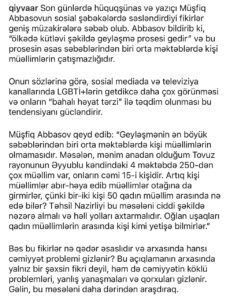BAKU, July 21 — Azerbaijani lawyer and writer Müşfiq Abbasov has ignited a firestorm on social media following controversial comments blaming a “mass gayification process” on the lack of male teachers in the country’s secondary schools. His statements, widely circulated online, have drawn criticism for promoting harmful stereotypes and scapegoating the LGBTQ+ community.
Speaking in a recent video, Abbasov claimed that Azerbaijan is undergoing a “mass process of becoming gay” and argued that one of the key drivers is the shortage of male teachers in the education system. He cited his native village in Tovuz district, where out of more than 250 teachers across four schools, only 15 are men. According to Abbasov, this imbalance prevents young boys from having male role models and contributes to the alleged “trend” of homosexuality.
“Male teachers have become ashamed and no longer enter the staff room,” he claimed. “How can one or two men among 50 women influence anything? The Ministry of Education must take this seriously. Boys cannot grow into men surrounded only by female teachers.”
Stay Ahead with Azerbaijan.usGet exclusive translations, top stories, and analysis — straight to your inbox.
He further argued that the increasing visibility of LGBTQ+ people in media and television — particularly portrayals of their “luxurious lifestyle” — is encouraging youth to adopt similar identities.

A Backlash Rooted in Misconceptions
Abbasov’s comments have drawn sharp rebukes from human rights activists, educators, and civil society members who accuse him of promoting regressive and baseless narratives. Critics argue that his statements reflect a broader problem of homophobia and gender bias in Azerbaijani discourse — one that oversimplifies complex social issues and directs public frustration toward vulnerable communities.
“Blaming homosexuality on the presence of women or LGBTQ+ visibility is not only scientifically unfounded but dangerously misleading,” said one education expert. “This rhetoric shifts attention away from real challenges like teacher pay, quality of instruction, or access to resources.”
Observers also point out that equating masculinity with the mere presence of male authority figures perpetuates outdated gender norms and marginalizes the role of women in society — particularly in professions like teaching, where women have long held the majority due to systemic underpayment and lack of incentives for men.
A Symptom of Deeper Social Tensions
Some commentators have called Abbasov’s remarks a reflection of deeper societal anxieties around changing norms, media influence, and a lack of meaningful dialogue on gender and sexual diversity.
“This isn’t just about one man’s opinion — it exposes how societal discomfort with gender roles and sexual identity is being projected through pseudo-moral panic,” one political sociologist told our newsroom.
While Abbasov’s comments may resonate with a conservative segment of society, they also underscore the urgent need for inclusive education, proper teacher training, and public awareness campaigns that promote respect, equality, and scientific understanding — not fear or prejudice.
As the discussion unfolds, the real challenge for Azerbaijani policymakers and educators will be to rise above inflammatory rhetoric and focus on evidence-based solutions that ensure all students, regardless of gender or identity, receive a quality education in a respectful and supportive environment.


